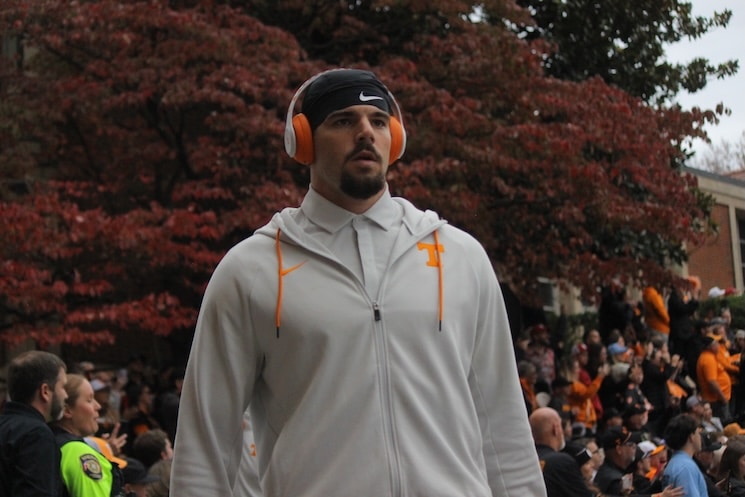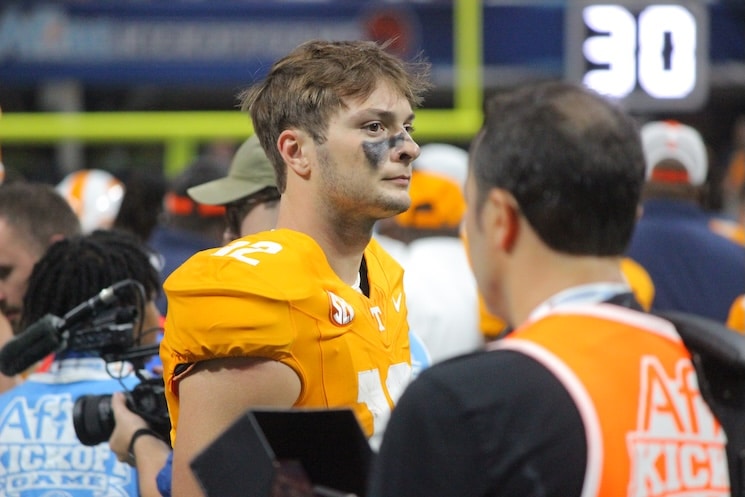
That’s when it all began for me. The 80s. When I really cut my teeth on Tennessee Football. Sure, I remembered some from the 70s, especially when Johnny Majors came home from Pitt, fresh off a natty and armed with a promise to deliver his alma mater back to greatness. But I started plugging in harder during the 80s, the time when Johnny would make good on that promise, ultimately setting the table for the glory days that would follow.
Back then, the NCAA football landscape was dotted with perennial powers like Alabama, Nebraska, Penn State, Michigan (and another I’ll save for later) — schools which were essentially football factories, each effortlessly reloading from one star-studded class to the next.
But not Tennessee. The Vols weren’t of that ilk. Tennessee was more of a chippy underdog you’d best not take lightly as opposed to some high-falutin football program. Sure there was the history of General Neyland, but there was also the sense that the Vols were always chasing that history. And in the early 80s, there was still quite a ways left to go. But that didn’t mean the men in orange weren’t willing to give full pursuit. Because they were. And all you had to do was watch them on any given fall Saturday to figure that out.
That’s how I first remember ESPN portraying the Vols. As a gritty team that under-promised and over-delivered. One cheered on by a crazy-ass, orange-clad nation that would rise up and support their own like no other. It didn’t matter what your record was, the Vols were ready to get it on. And if you were a blue-blooded program steeped in history? Well then you could take that pedigree and shove it straight up your ass for all Vol Nation cared.
Because when you faced them Volunteers, by God, you’d best beware. Particularly if that contest went down in Knoxville.
In essence, the football team and the rabid fanbase that hung breathlessly upon their every play had assumed the personality of the town they represented. And there’s a certain unrest in a place like Knoxville where elements of rural agrarian South encounter elements of urban industrial North, an unrest captured brilliantly by one of Knoxville’s very own, author Cormac McCarthy in his book Suttree.
McCarthy’s Knoxville exhibited a veneer of the genteel South that politely concealed the underbelly of its hardscrabble frontier roots as well as that of a gritty and struggling urban population. Such an underlying dichotomy creates a tension that continuously simmers just beneath the surface which in turn creates a place that’s but an insult away from an all-out fistfight.
And that feistiness — that tension — was on full display in the 80s, a time when this town was growing up and coming into its own, distancing itself from those hardscrabble roots even as it pulled directly therefrom to create that separation. Remember the 1982 World’s Fair? There was a Wall Street Journal reporter who suggested Knoxville didn’t have what it took to pull off such an event.
Bad call. Because if you want to bring Knoxville together, then patronize it. Suggest it can’t do something. Because we’ll come together like never before and show you we can, if for no reason than for the sheer and utter hell of it.
That’s what the 80s UT Football scene felt like to me. A proud fanbase with a chip on its shoulder that supported a team and a coach that had the same. A bunch of folks getting each other’s back, united like one big family.
And if there was ever a night that epitomized the Vols of the 80s, it was that magical one in New Orleans after the 1985 season, when Tennessee squared off against another of the 80s football factories, perhaps the marquee team of the decade, the team I saved for later — the heavily favored Miami Hurricanes.
Things were going according to plan when Vinny Testeverde and company got out to a 7-0 lead. But UT flipped the script and went on to orchestrate a 35-7 beatdown which told any and everyone who watched what Knoxville thought about the Miamis of the world even if Keith Jackson was reluctant to get the message.
Yeah, Tennessee Football in the 80s was a family affair, alright. Led by men like James Berry, Willie Gault, Anthony Hancock, Bill Bates, Mike Cofer, Lee Jenkins, Reggie White, Alvin Toles, Alan Cockrell, Carl Zander, Johnnie Jones, the McKenzie twins, Tim McGhee, Jeff Powell, Eric Swanson, Joey Clinkscales, Dale Jones, Terry McDaniel, Anthony Miller, Todd Kelly, Harry Galbreath, Tony Robinson, Roland Poles, Chuck Webb, Reggie Cobb, Keith DeLong, Andy Kelly, Carl Pickens, Dale Carter, and the list goes on and on.



